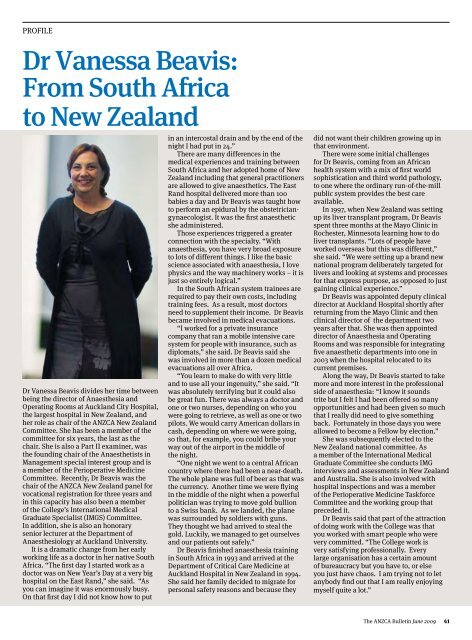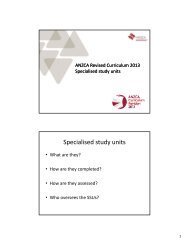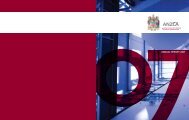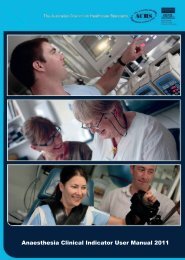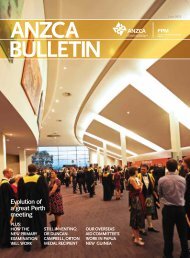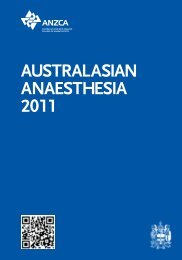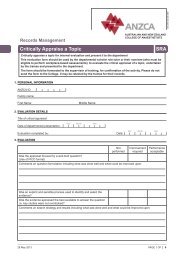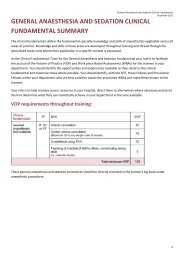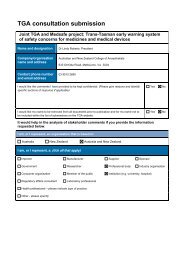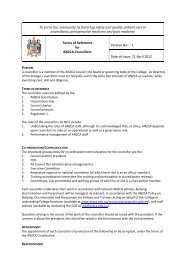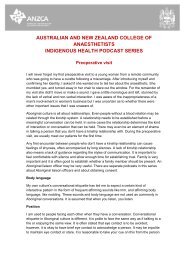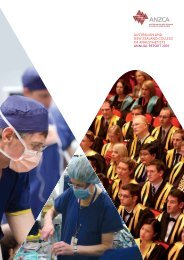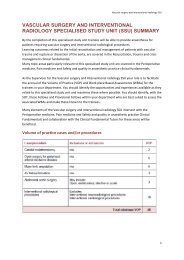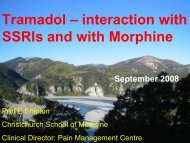ANZCA Bulletin - June 2009 - Australian and New Zealand College ...
ANZCA Bulletin - June 2009 - Australian and New Zealand College ...
ANZCA Bulletin - June 2009 - Australian and New Zealand College ...
- No tags were found...
Create successful ePaper yourself
Turn your PDF publications into a flip-book with our unique Google optimized e-Paper software.
profileDr Vanessa Beavis:From South Africato <strong>New</strong> Zeal<strong>and</strong>Dr Vanessa Beavis divides her time betweenbeing the director of Anaesthesia <strong>and</strong>Operating Rooms at Auckl<strong>and</strong> City Hospital,the largest hospital in <strong>New</strong> Zeal<strong>and</strong>, <strong>and</strong>her role as chair of the <strong>ANZCA</strong> <strong>New</strong> Zeal<strong>and</strong>Committee. She has been a member of thecommittee for six years, the last as thechair. She is also a Part II examiner, wasthe founding chair of the Anaesthetists inManagement special interest group <strong>and</strong> isa member of the Perioperative MedicineCommittee. Recently, Dr Beavis was thechair of the <strong>ANZCA</strong> <strong>New</strong> Zeal<strong>and</strong> panel forvocational registration for three years <strong>and</strong>in this capacity has also been a memberof the <strong>College</strong>’s International MedicalGraduate Specialist (IMGS) Committee.In addition, she is also an honorarysenior lecturer at the Department ofAnaesthesiology at Auckl<strong>and</strong> University.It is a dramatic change from her earlyworking life as a doctor in her native SouthAfrica. “The first day I started work as adoctor was on <strong>New</strong> Year’s Day at a very bighospital on the East R<strong>and</strong>,” she said. “Asyou can imagine it was enormously busy.On that first day I did not know how to putin an intercostal drain <strong>and</strong> by the end of thenight I had put in 24.”There are many differences in themedical experiences <strong>and</strong> training betweenSouth Africa <strong>and</strong> her adopted home of <strong>New</strong>Zeal<strong>and</strong> including that general practitionersare allowed to give anaesthetics. The EastR<strong>and</strong> hospital delivered more than 100babies a day <strong>and</strong> Dr Beavis was taught howto perform an epidural by the obstetriciangynaecologist.It was the first anaestheticshe administered.Those experiences triggered a greaterconnection with the specialty. “Withanaesthesia, you have very broad exposureto lots of different things. I like the basicscience associated with anaesthesia, I lovephysics <strong>and</strong> the way machinery works – it isjust so entirely logical.”In the South African system trainees arerequired to pay their own costs, includingtraining fees. As a result, most doctorsneed to supplement their income. Dr Beavisbecame involved in medical evacuations.“I worked for a private insurancecompany that ran a mobile intensive caresystem for people with insurance, such asdiplomats,” she said. Dr Beavis said shewas involved in more than a dozen medicalevacuations all over Africa.“You learn to make do with very little<strong>and</strong> to use all your ingenuity,” she said. “Itwas absolutely terrifying but it could alsobe great fun. There was always a doctor <strong>and</strong>one or two nurses, depending on who youwere going to retrieve, as well as one or twopilots. We would carry American dollars incash, depending on where we were going,so that, for example, you could bribe yourway out of the airport in the middle ofthe night.“One night we went to a central Africancountry where there had been a near-death.The whole plane was full of beer as that wasthe currency. Another time we were flyingin the middle of the night when a powerfulpolitician was trying to move gold bullionto a Swiss bank. As we l<strong>and</strong>ed, the planewas surrounded by soldiers with guns.They thought we had arrived to steal thegold. Luckily, we managed to get ourselves<strong>and</strong> our patients out safely.”Dr Beavis finished anaesthesia trainingin South Africa in 1993 <strong>and</strong> arrived at theDepartment of Critical Care Medicine atAuckl<strong>and</strong> Hospital in <strong>New</strong> Zeal<strong>and</strong> in 1994.She said her family decided to migrate forpersonal safety reasons <strong>and</strong> because theydid not want their children growing up inthat environment.There were some initial challengesfor Dr Beavis, coming from an Africanhealth system with a mix of first worldsophistication <strong>and</strong> third world pathology,to one where the ordinary run-of-the-millpublic system provides the best careavailable.In 1997, when <strong>New</strong> Zeal<strong>and</strong> was settingup its liver transplant program, Dr Beavisspent three months at the Mayo Clinic inRochester, Minnesota learning how to doliver transplants. “Lots of people haveworked overseas but this was different,”she said. “We were setting up a br<strong>and</strong> newnational program deliberately targeted forlivers <strong>and</strong> looking at systems <strong>and</strong> processesfor that express purpose, as opposed to justgaining clinical experience.”Dr Beavis was appointed deputy clinicaldirector at Auckl<strong>and</strong> Hospital shortly afterreturning from the Mayo Clinic <strong>and</strong> thenclinical director of the department twoyears after that. She was then appointeddirector of Anaesthesia <strong>and</strong> OperatingRooms <strong>and</strong> was responsible for integratingfive anaesthetic departments into one in2003 when the hospital relocated to itscurrent premises.Along the way, Dr Beavis started to takemore <strong>and</strong> more interest in the professionalside of anaesthesia: “I know it soundstrite but I felt I had been offered so manyopportunities <strong>and</strong> had been given so muchthat I really did need to give somethingback. Fortunately in those days you wereallowed to become a Fellow by election.”She was subsequently elected to the<strong>New</strong> Zeal<strong>and</strong> national committee. Asa member of the International MedicalGraduate Committee she conducts IMGinterviews <strong>and</strong> assessments in <strong>New</strong> Zeal<strong>and</strong><strong>and</strong> Australia. She is also involved withhospital inspections <strong>and</strong> was a memberof the Perioperative Medicine TaskforceCommittee <strong>and</strong> the working group thatpreceded it.Dr Beavis said that part of the attractionof doing work with the <strong>College</strong> was thatyou worked with smart people who werevery committed. “The <strong>College</strong> work isvery satisfying professionally. Everylarge organisation has a certain amountof bureaucracy but you have to, or elseyou just have chaos. I am trying not to letanybody find out that I am really enjoyingmyself quite a lot.”The <strong>ANZCA</strong> <strong>Bulletin</strong> <strong>June</strong> <strong>2009</strong> 41


